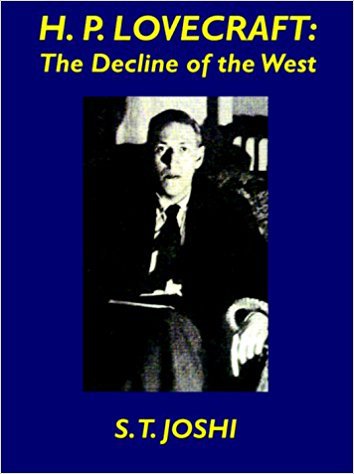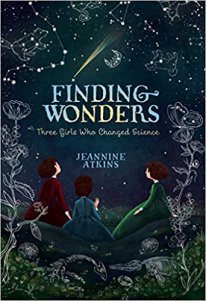The Lovecraft series continues with a long look at a title S. T. Joshi still considers one of his most important works on Lovecraft.
For those who want something else of mine touching on some of the themes of this book, check out my review of Lovecraft’s Letters to James Morton.
Raw Feed (2005): H. P. Lovecraft: The Decline of the West, S. T. Joshi, 1990.
This was a fascinating, illuminating book.
It is not that Lovecraft’s individual ethics, philosophical notions of materialism, politics, and notions of aesthetics were that unique. It is the combination that was somewhat unique and, most importantly — as Joshi convincingly shows — how those views consistently show up in his fiction.
In the first half of the book, Joshi documents (mostly through Lovecraft’s voluminous correspondence) the development of Lovecraft’s philosophy and how it was influenced by others — philosophers ancient and modern and science.
Lovecraft, descendant of a wealthy New England family that, in his childhood, fell on hard times, was a lifelong aristocrat. Always suspicious of democracy, Joshi shows how he moved from notions of an aristocracy of birth to (with relapses expressed in his letters and often involving race) an aristocracy of intellect. Thus he moved from a sentimental “royalist” (of course America has no official royalty but Anglophiliac Lovecraft earlier expressed, in his associated love for 18th Century England and Colonial America, a love of English royalty — or, at least, Queen Anne) and Republican to an advocate of “fascistic socialism” and voter for Franklin Delano Roosevelt.
Lovecraft expressed a desire for sort of a technocratic government run by small band of experts. He died in 1937 so fascism was not discredited as a philosophy then, and many people shared this vision of socialism — so many, in fact, that Freidrich Hayek had to write an attack on the theoretical underpinnings of it. [That would be The Road to Serfdom.] Lovecraft, incidentally, had no illusions that he was one of the people qualified for such a governing post nor did he have any interest in doing so.
As far as communism, Lovecraft detested the Soviets for the cultural destruction their regime wrought in Russia.
Lovecraft tried to keep up on the theories of modern science including the two giant theories of twentieth century science: relativity and quantum mechanics. Like many others, he was horrified at what these theories did to the beauty of his beloved 19th century science and the classical physics behind it.
Yet, he accepted their validity though, curiously, he doesn’t seem to have abandoned the idea of aether which relativity put an end to. This explains that the references to aether in his 1930 story “The Whisperer in Darkness” really are to the aether that the Michaelson-Morley experiment cast doubt on. Joshi explains that as late as 1936, Lovecraft attended a lecture by a physicist explaining, in his view, how the Michaelson-Morley experiment did not completely explain away aether so, even then, “certain conservative physicists” were debating the results of an 1887 experiment.
Lovecraft was a strict materialist and a determinist — which is not to be confused with a fatalist. Both view our actions as inevitably preceding (and, theoretically, calculable) from initial conditions in the universe. The fatalist accepts this and doesn’t struggle. The materialist accepts it and notes the struggle is foreordained as well. Lovecraft’s famous summation of his philosophy is that
human laws and interests and emotions have no validity or significance in the vast cosmos-at-large.
Of course, as Joshi notes, we have to be cautious about accepting this at face value. It comes from a letter to Weird Tales describing the origins of his story “The Call of Cthulhu“. At another time, Lovecraft described man as a momentary trifle sprung from nothingness and destined to go back.
And yet, Lovecraft was hardly an anarchist or nihilist. He had definite opinions.
He felt the pursuit of beauty was life’s chief object.
He refused to adopt a religious faith ironically just to add glib purpose and pre-set morals to life since he didn’t think any faith based on reality. Rather, he thought, we should accept the beliefs of our “tradition-stream”, the environment we spring from and, (though he doesn’t specifically state this — at least not in this book) — adapted to in an evolutionary sense.
It is that modern acceptance of science, denial of even a token religion, combined with materialism and a love and abiding ease with the past and hatred of the modern that makes Lovecraft somewhat unique. Remarks by Lovecraft like
Life is a hideous thing, and from the background behind what we know of it peer daemonical hints of truth which make it sometimes a thousandfold more hideous. Science, already oppressive with its shocking revelations, will perhaps be the ultimate exterminator of our human species — if separate species we be — for its reserve of unguessed horrors could never be borne by mortal brains if loosed upon the world. (from “Facts Concerning the Late Arthur Jermyn and His Family”)
or
The most merciful thing in the world, I think, is the inability of the human mind to correlate its contents. (from “The Call of Cthulhu”)
are not just rococo variations on the old, Christian derived “Things man was not meant to know.”
Atheist Lovecraft certainly did not think there was any God sanctioning the gathering of certain types of scientific knowledge. But he certainly seems to have thought there were certain types of knowledge the individual human brain and, by extension, society was better off not knowing. And Lovecraft’s unhappiness extended to modern civilization.
The title of this work, a take off on Oswald Spengler’s The Decline of the West, is not a mere pun. Lovecraft read Spengler and mostly agreed with him.
I’ve never read Spengler who, if Joshi’s summation is correct, said that civilizations followed the inevitable path that individual organisms did: birth, growth, senesance (i.e. decadence), and death. Lovecraft largely agreed with Spengler though he thought he took the biological metaphor too far. Joshi says its hard to argue Spengler’s philosophy since he seems to have gotten his historical facts right.
Much of Lovecraft’s explicit politcal thought — written when he begin to think more about such matters (other than an innate, kneejerk pro-British, pro-aristocrat, anti-democracy stance) — shows up in three of his greatest (and most science fictional tales): “The Mound”, “At the Mountains of Madness”, and “The Shadow Out of Time”. Joshi convincingly defends his notion that these are, in part, satires on modern life.
And some of the issues we are still arguing. Lovecraft railed against “machine-culture”. He seems to have meant not only the economic and social problems of machines taking human jobs but industrial capitalism. (The problem of technological unemployment is one we don’t hear a lot of public talk about anymore, but more jobs are being automated now than ever before. And another sort of unemployment, outsourcing, is facilitated by technology.) [We hear a lot more about it now, 12 years after I wrote this.]
Lovecraft echoes an argument that is somewhat similar to conservatives arguing about cultural decay and “toxic” popular culture though they often refuse to acknowledge that there is an inherent contradiction between conserving old values and supporting the extremely efficient mechanism of capitalism which, amongst other things, admirably serves the “baser instincts” of the populace. In short, rising wealth and a growing middle class and the mechanically produced media they bought, came to value “amusement enterprises” more than “intrinsic excellence” (both Lovecraft’s phrases).
Sure humanity was wealthier, but art was worse than that produced in the days of peasants and aristocrats. (The current libertarian answer to this is that greater market efficiencies allow niche markets and tastes to be better served. There seems mixed evidence for that. Also, many capitalists did not turn out to be, unlike some — though hardly all — aristocrats of the past, great patrons of the arts.)
Lovecraft even toyed with the old and conventionally unconvincing idea of educating the masses. Joshi’s acidic and snotty comment at this part of the book is that Lovecraft could hardly have known we would have a
populace whose highest aesthetic experiences are pornography, television miniseries, and sporting events.
Animalistic and simple pleasures are always seductive, I would retort, and capitalism will always answer them. However, the basic sexual instinct that leads to viewing porn does not preclude appreciating fine lit. The same goes for sports or tv.
This book’s prose is clear even when dealing with philosophical issues and is a model of what readable literary criticism should be. However, Joshi, besides a bit of an elitist in the bad sense (that popular culture is to be despised even when it throws up a Lovecraft), seems to be a socialist (given the swipes at Ronald Reagan and capitalism) and an atheist (I say that because I know he edited an atheist reader.)
Indeed, he shares Lovecraft’s love of both classicism and weird fiction to the extent that I wonder if he likes Lovecraft because of kindred interest or if Lovecraft led him to them.
Still, Joshi intrudes his personal philosophy quite sparingly, and his remarks about Lovecraft are valid and interesting.
He notes the obvious: the madness of many a Lovecraft protagonist is not insanity but the result of paradigms (of the most advanced and accepted sort in terms of science) being shattered — in other words, too much knowledge.
Though it surprises Joshi (I suspect because he is, himself, of the socialist persuasion), there is a strong streak of censorship and covering up of the truth in Lovecraft stories. It reaches its peak in “The Shadow Over Innsmouth” when some of the inhabitants of the town are put in “concentration camps”. As he notes, that sounds like something out of Nazi Germany or the USSR. It strikes me as a logical corollary of Lovecraft’s aristocratic tendencies and the elitist tendencies of socialism.
Joshi, who is something of an expert on Lord Dunsany, talks about his influence on Lovecraft and how Lovecraft’s misunderstanding of that author led to his later criticisms that Dunsany had become too adult, lost his child-like innocence and unironic in his later work. Joshi interestingly speculates that this trend in Dunsany bothered Lovecraft because Lovecraft was doing something similar.
Lovecraft eventually merged the techniques of the modern realists, whose depressing quotidian, character-centered concerns he hated, with his love of the weird. For Lovecraft, the best weird fiction provided a substitute for religion, an escape from the “intolerable tyranny of time, space, change, and natural law.”. (Joshi seems to be of the school that science fiction didn’t exist before Amazing Stories.)
Lovecraft may have unwarrantedly (like other intellectuals) drawn moral conclusions from quantum mechanics and relativity (Joshi is good about pointing out inconsistencies and fallacies in Lovecraft’s philosophical reasonings), but he rightly thought foolish modern artists like T. S. Eliot and others who thought they could build a new aesthetic out of the new scientific findings. Lovecraft doesn’t state it, but their problem was that they thought that people found beauty in meaning embued things they don’t normally perceive, in metaphors constructed from things totally out of their normal experience.
Joshi rightly tackles the issue of Lovecraft’s racism. There’s no doubt that Lovecraft pre-judged people by their race, tended to judge them in groups, regarded blacks as inferior. Joshi rightly puts Lovecraft in the context of his time without excusing.
The problem is that Joshi’s reasoning on race and immigration (something of much concern to Lovecraft who saw it destroying his beloved New England) is stereotypically liberal and wrong.
Frank Boaz may have claimed that there were no inherent racial differences, but plenty have been found since then. (Though I don’t know the state of the research in 1990 when this book was written.) To speak of innate racial differences is not to speak of inferiorty — except in the context of specific settings because each race bears the marks of being selected for a particular environment. However, there are innate differences and they may show up in the success each race shows in a particular environment — and a social and political and economic culture is an environment. To note differences is not to be a white supremacist — after all, the most controversial area of racial differences is in IQ and whites are not first there.
Nor is it fair to chide Lovecraft for worrying that non-Anglo Saxon immigrants to America may bring their cultural habits with them and change a country. Lovecraft didn’t mind assimilated immigrants — he married an assimilated Jew though he didn’t like Jews much. Nor is it fair to mock Lovecraft for noting the reality of foreigners — for whatever reason — smelling different. [For the curious, the apocrine glands, which produce most of the body odor in humans, do show racial differences in size and distribution. Cultural differences in hygiene and diet could conceivably make differences too. However, what Lovecraft meant by a “foreigner” certainly included those he would have been close to in DNA terms so Joshi’s mocking is partly justified.]
Joshi does make the interesting observation that a lot of Lovecraft stories center around the breaking of racial-(be it human or extraterrestrial)-cultural boundaries, Culture and race are tightly — though not completely — linked in Lovecraft’s mind. Aliens are horrible because they pretend to be human or adopt human ways or humans adopt alien ways.
A very worthwhile book for explaining Lovecraft.
Judging from the response that John Derbyshire got when mentioning Lovecraft in National Review Online (and John J. Miller, another editor of the magazine, just did a review of the Library of America edition of some of Lovecraft’s stuff.), there seems to be a fair number of conservatives who are Lovecraft fans.
My new theory is that they, some of their fellow conservatives, and people of other political persuasions may still find Lovecraft compelling because, subconsciously or half-wittingly, they are picking up on the theme of this book: Lovecraft’s disgust with the modern world and fear of the changes its science portends for the human mind.
More reviews of Lovecraft related material are on the Lovecraft page.
Advertisements Share this:




